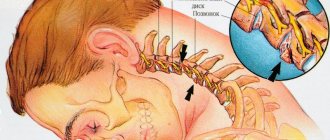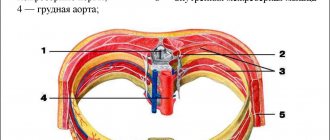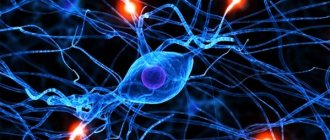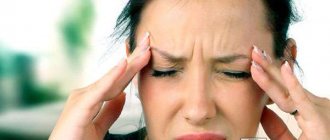General weakness, lack of coordination, a feeling of falling, darkening of the eyes after getting out of bed in the morning can occur due to lack of sleep or nervous tension. Often after sleep, when turning, you feel dizzy due to lack of blood sugar and taking medications. Systematic morning dizziness (vertigo) is a signal that you need to see a specialist. A disruption in the interaction of the vestibular apparatus, visual organs and brain may indicate the development of a pathological process in various systems of the body.
Pathologies of the structures of the inner ear
One of the common causes of dizziness and nausea in the morning is damage to the otolithic apparatus located in the inner ear. It is this that is part of the vestibular apparatus and provides linear accelerations (movements up and down, left and right, back and forth).
This phenomenon is called benign paroxysmal positional vertigo (BPPV). It occurs when the body changes position in space, for example, when moving from horizontal to vertical. Attacks of dizziness can be very severe, lasting from a few seconds to 1 minute.
They occur not only in the morning, but also during the day when turning the neck or throwing back the head. Sometimes with BPPV, a person constantly feels a slight sway throughout the day. If you avoid provoking movements, your health improves.
Damage to the otolithic apparatus is difficult to diagnose. The diagnosis can only be confirmed using the Dix-Hallpike test, in which the doctor turns the head of a patient sitting on the couch 45° up and to the right, then abruptly places him on his back with his head thrown back 30°.
Then repeat the same thing with the head turned in the other direction. The test gives a positive result with a special eye movement (torsional nystagmus) and an attack of dizziness.
The causes of damage to the otolith organ remain unknown; presumably this is the result of traumatic brain injuries, viral diseases, therapy with potent antibiotics, and surgical operations. It may occur as a concomitant symptom of other diseases. BPPV often appears in older people.
If the diagnosis is confirmed, therapy is carried out with special exercises with the addition of betahistine drugs. Sometimes attacks of the disease are spontaneously replaced by a long period of remission - from several days to several years.
Cervical osteochondrosis
Another cause of dizziness and nausea in the morning may be osteochondrosis of the cervical spine. This is the destruction of the intervertebral discs of the neck, which provide flexibility, mobility and shock absorption to this part of the spine.
It occurs as a result of constant microtraumas when lifting heavy objects, uneven distribution of the load on the spinal column, stooping, weakening of the spinal muscles, and prolonged exposure to an uncomfortable position. The distance between the vertebrae gradually decreases, the spine compresses and crushes the intervertebral discs. In this case, the nerve roots are compressed, and the person experiences severe pain.
Since the vertebral artery passes through the canal formed by the transverse processes of the cervical vertebrae, with osteochondrosis it is pinched and compressed.
Accordingly, the blood supply and normal functioning of those parts of the brain that it nourishes are disrupted: the posterior third of the brain, the cerebellum, that is, the center for coordination of movements. It is for this reason that attacks of dizziness and nausea occur.
Additional symptoms may include:
- headache ;
- noise in the ears and head;
- vomit;
- fainting;
- weakness and numbness;
- double vision, decreased visual acuity.
On this topic
- Dizziness
5 reasons for dizziness when turning your head
- Natalia Sergeevna Pershina
- June 5, 2020
If dizziness and nausea with cervical osteochondrosis occur in the morning, the reasons may be an uncomfortable posture, a pillow that is too high, or a sagging mattress. Therefore, it is better to use orthopedic bedding.
The diagnosis is confirmed by a neurologist and/or traumatologist. Long-term treatment includes:
- taking medications;
- massage;
- physical therapy;
- manual therapy.
If the situation is complicated by a herniated disc, then in some cases a consultation with a neurosurgeon is indicated.
Prevention can prevent any disease. To avoid osteochondrosis, you need to correct any curvature of posture in time, train the muscles that support the spine, fight excess weight, and include foods rich in calcium, phosphorus, and vitamins in your diet.
Symptoms
Dizziness in the morning when getting up and nausea are accompanied by other symptoms. In particular, these are:
- Dry mouth.
- Loss of sense of balance.
- Feeling of spots in the eyes.
- Unpleasant sensations in the stomach, right hypochondrium.
Dry mouth is associated with disorders in the autonomic nervous system, hormonal problems, and dehydration. It occurs in non-insulin-dependent diabetes mellitus along with symptoms such as extreme thirst and excessive urination. Nausea in diabetes is caused by hypoxia of the vestibular centers of the brain responsible for balance. Glycated hemoglobin is not able to fully compensate for oxygen deficiency.
Female PMS: can you feel dizzy before your period and how to get rid of the unpleasant symptom?
Symptoms of sunstroke in adults and children: main signs, treatment.
Vegetative-vascular dystonia may be accompanied by dry mouth, as well as dizziness, especially when standing up. Floaters in the eyes are a consequence of cerebral ischemia and lack of oxygen. Dizziness in the morning when getting up is the result of delayed regulation of vascular tone.
Nausea, stomach cramps, pain in the right hypochondrium are symptoms that are often complained about in addition to loss of balance and staggering. These are signs of dysfunction of the vestibular apparatus.
Increased intracranial pressure
There is a whole group of pathological conditions accompanied by increased intracranial pressure (intracranial hypertension), which occurs in two ways:
- the appearance of a tumor in the brain tissue, which expands and creates excess pressure;
- disruption of the flow of cerebrospinal fluid, resulting in edema (a benign form of intracranial hypertension).
On this topic
- Dizziness
11 causes of dizziness, ringing and tinnitus
- Natalia Sergeevna Pershina
- June 3, 2020
The main symptom is dizziness in the morning after sleep, accompanied by headache, nausea, and vomiting. This occurs because in a horizontal position, fluid in the brain is produced more actively and, when elevated, creates especially strong pressure inside the skull. Frequent surges in blood pressure, increased nervousness, sensitivity to weather, frequent fatigue, depressed consciousness, and fainting are also possible.
The main reasons for increased pressure inside the cranial cavity:
- tumors, brain hematomas;
- injuries ;
- infections affecting the central nervous system (meningitis, encephalitis);
- inflammatory processes in brain tissue;
- stroke and aneurysms;
- water-electrolyte imbalance ;
- dropsy (hydrocephalus) of the brain.
A benign manifestation of intracranial hypertension goes away on its own, or after a course of taking diuretics, establishing a drinking regimen, diet, and special exercises. In other cases, intracranial hypertension requires a serious and detailed examination by qualified specialists.
In case of acute attacks of pain and fainting, you need to call an ambulance. Failure to pay attention to the problem in a timely manner leads to complications, including death.
Folk recipes
Our ancestors found ways to cure any ailment.
Simple and completely natural medicines will help alleviate your condition:
- Sweet water. Need a spike in your sugar levels? Dilute 2 teaspoons in 1 glass of warm water and drink after waking up.
- Invigorating gathering. An infusion of mint, lemon balm and lemongrass will help fill the body with energy and relieve fatigue. Place a teaspoon of dry chopped herbs into a container and pour 0.5 liters of boiling water. Let it brew for an hour - the useful drug is ready.
- Calming collection. To alleviate the effects of stress or anxiety, drink an infusion of chamomile, lemon balm and crushed valerian root. When all the ingredients are brewed, add 2 teaspoons of honey and apple cider vinegar to the infusion. Take half an hour before breakfast for 2-4 weeks, as in the previous recipe.
- For cervical osteochondrosis. To prepare the rubbing, mix 1 teaspoon each of camphor alcohol and iodine and 150 ml of alcohol. Add 5 crushed painkillers to this and lubricate the sore spots.
- From anemia. Prepare a strong infusion of nettle from 2 tablespoons of dry herbs and 0.5 liters of boiling water. Let it brew for 5 hours and add a glass of natural apple juice to the infusion.
But you should not be treated only with traditional recipes, no matter what the cause of dizziness in the morning after sleep.
Orthostatic (postural) hypotension
This is the term used to describe a sharp decrease in blood pressure when moving from a lying or sitting position to a standing position. This is that feeling of dizziness and slight nausea that occurs if you suddenly get out of bed in the morning after sleep. Sometimes a person may faint.
In most cases it is not a disease. The fact is that during sleep, blood pressure on the walls of blood vessels drops, and the heart rate decreases. After waking up, when you need to get up, these parameters increase instantly for some people, and for others - after a few seconds, then a temporary lack of cerebral blood supply occurs.
Therefore, orthostatic hypotension can be considered an individual feature of the body, which often affects tall people, adolescents during periods of active growth, patients with vegetative-vascular dystonia, and elderly patients.
Frequent manifestations of orthostatic hypotension require consultation with a doctor, as they may be a concomitant symptom of other diseases, for example:
- phlebeurysm ;
- arrhythmia;
- heart failure;
- mitral valve weakness
- hidden (implicit) blood loss.
Therefore, treatment for orthostatic hypotension depends on its cause.
Treatment
A complete diagnosis is required: ultrasound, MRI of the brain, electroencephalogram. If you have nausea, you should check the digestive organs using fibrogastroduodenoscopy, ultrasound of the liver, and gall bladder. Measuring blood pressure in the morning with a tonometer is also necessary. Ultrasound and electrocardiography are used to examine the heart.
Treatment is carried out by a neurologist. Therapy depends on the cause of the pathology:
- If cerebral circulation is impaired, vasodilators are prescribed: Cavinton, Stugeron.
- If the balance is disturbed in the morning due to Meniere's disease, histamine agonists (Betaserc) are used.
- Violation of the activity of the vestibular nerves is corrected using the RANC method - restoration of the activity of nerve centers through a special method of reflexology.
- Gastrointestinal diseases are treated by a gastroenterologist.
- To increase blood pressure in case of hypotension, caffeine-containing drugs and cardiotonics are used as prescribed by a doctor. Potassium and magnesium help improve the activity of the heart muscle.
Conclusion
Loss of balance after standing up and lightheadedness may be symptoms of a disorder of the autonomic nervous system or heart damage. In older people, this may be a sign of a stroke. Timely seeking medical help will help improve your quality of life.
«>
Hypotonic crisis
Hypotonic crisis is the most dangerous cause of dizziness and nausea when suddenly rising from bed. Accompanied by general weakness, ringing in the ears, headache, whitening of the skin, and fainting. This is a sharp sudden drop in blood pressure below the permissible threshold, while all tissues and organs experience an acute lack of oxygen, the pulse slows down, and breathing is suppressed.
Causes:
- disturbance of vascular tone;
- heart failure;
- hypotension;
- blood loss.
In these diseases, a hypotonic crisis can be triggered by a sudden change in body position in space (quick rise from bed), heat stroke, emotional shock, pain, and injury.
A hypotensive crisis is a critical condition; if this occurs, you must immediately call an ambulance. The longer the body experiences a lack of oxygen, the more irreversible processes occur in it, especially for brain tissue.
Before the ambulance arrives, you need to provide basic first aid:
- lay the victim on a horizontal surface or sit him down, placing his head below his knees;
- unbutton tight clothing;
- open a window or take it outside;
- if a person faints, you need to bring him back to consciousness - let him smell ammonia , pat him on the shoulders, talk, ask him to answer questions, do not let him “float away”.
If possible, you need to measure the victim’s blood pressure every 10-15 minutes, and then report these readings to the ambulance team. You should not give a person substances that increase blood pressure (medicines, coffee), as this will provoke a sharp rise in blood pressure.
When should you see a doctor?
If an attack occurs again, it is necessary to donate blood for examination. Situations in which mandatory medical care is required:
- numbness of the arms and legs, impaired sensitivity;
- high body temperature, the appearance of a gag reflex;
- vertigo along with headaches;
- muscle weakness. This is a situation in which the patient is unable to make any movements;
- heart failure;
- Enlargement of the tongue to such a size that it begins to interfere with the mouth.
If in the presence of these situations you do not seek qualified help, the condition can be critical, even pre-stroke. To make a diagnosis, you will need to see several doctors: endocrinologist, cardiologist, neurologist, ophthalmologist.
Mandatory procedures include:
- Biochemical blood test.
- X-ray, tomography, cardiography.
- Dopplerography of blood vessels.
- Magnetic resonance imaging.
- Ultrasonography.
If a child has problems, you should contact your pediatrician.
6) Iron deficiency anemia
Iron deficiency anemia is a condition in which the blood contains little hemoglobin, the component that delivers oxygen to all organs and tissues. Then the person experiences weakness, lethargy, apathy, and decreased performance. He feels dizzy and has bouts of nausea. Symptoms appear even after proper rest and sleep.
The disease is associated with insufficient intake of iron into the body from food (a component of hemoglobin) or with poor absorption of this element. People with a monotonous, inadequate diet, vegetarians, children during periods of rapid growth, and women during their menstrual period are often susceptible to it.
Only the attending physician can confirm the diagnosis and determine the cause. Seeking medical help is necessary, as anemia can accompany more serious illnesses. To prevent iron deficiency, it is recommended to include in the diet red meat, liver, fish, seafood, legumes, fruits and vegetables rich in vitamin C (promotes the absorption of iron).
Other causes of dizziness and nausea in the morning
These include:
- Dehydration of the body: can develop due to poisoning or taking a large amount of weight loss products (since they do not burn fat, according to the manufacturer, but only remove water).
- Overeating: A large amount of blood is sent to the digestive organs to help “handle” a large portion of food, as a result the brain and other organs may experience a slight lack of blood supply.
- Taking sedatives (calming) drugs, tranquilizers, they reduce blood pressure and can cause dizziness when getting up.
- Lack of vitamins in early spring.
- Pregnancy
even in the early stages.
Sometimes the factors that cause dizziness and nausea in the morning may be minor and go away on their own. But in some cases, you need to pay attention to the problem in time to avoid the development of serious conditions.
What to do
If all the symptoms mentioned above appear and begin to appear frequently and bother a person, you cannot take measures on your own so as not to cause harm to the body. There are many recommendations on the Internet about the disease, but you cannot use them; in this situation, a specialist doctor will give the correct recommendation.
The necessary medications and exercises will help eliminate morning dizziness forever, and this will be a great relief for the body. Measures must be taken even if the disease is not detected so that the person feels normal in the morning.










